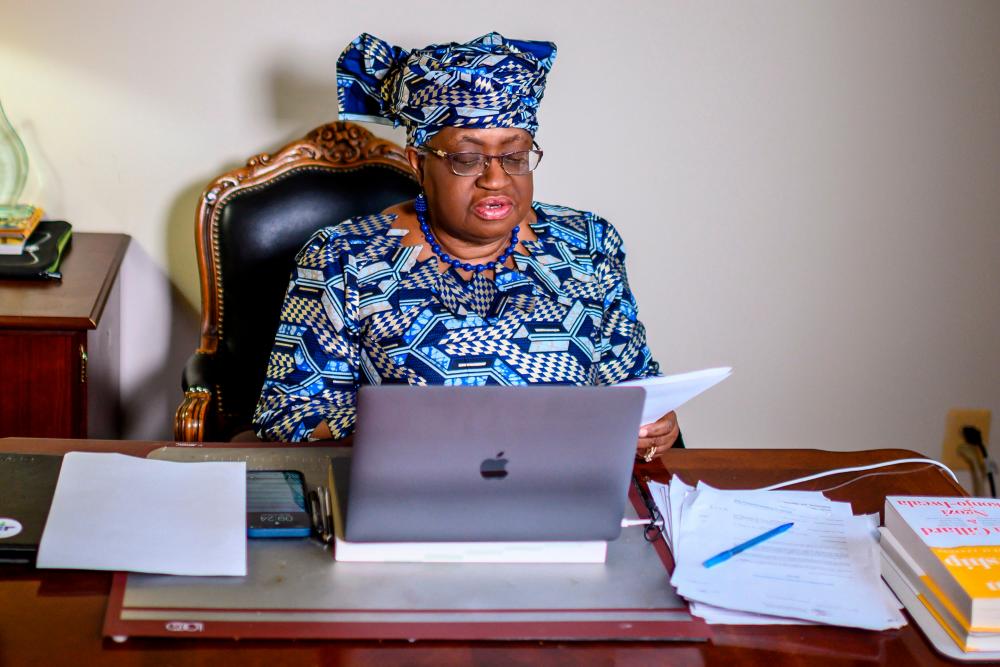GENEVA: Nigeria's Ngozi Okonjo-Iweala was appointed on Monday as the first female and first African head of the beleaguered World Trade Organization (WTO), saying a stronger WTO would be vital for the global coronavirus recovery.
The WTO called a virtual special general council meeting at which member states officially selected the former Nigerian finance minister and World Bank veteran as the global trade body's new director-general.
She will take up her post on March 1 and her term, which is renewable, will run until Aug 31, 2025.
The near-paralysed institution desperately needs a kick-start – something Okonjo-Iweala immediately addressed after being confirmed in the job.
"A strong WTO is vital if we are to recover fully and rapidly from the devastation wrought by the Covid-19 pandemic," the 66-year-old economist said in a statement. "I look forward to working with members to shape and implement the policy responses we need to get the global economy going again.
"Our organisation faces a great many challenges but working together we can collectively make the WTO stronger, more agile and better adapted to the realities of today."
South Korean Trade Minister Yoo Myung-hee had been the only other remaining contender for the post but pulled out when it became clear that new US President Joe Biden was swinging firmly behind Okonjo-Iweala's candidacy.
The organisation has been leaderless since Brazilian career diplomat Roberto Azevedo stepped down last August, a year ahead of schedule.
The process of picking one of eight candidates to succeed him had been expected to wrap up by November, but the administration of former US president Donald Trump blocked the consensus to appoint Okonjo-Iweala.
Okonjo-Iweala, who boasted US, EU and African backing, was not at the WTO's Geneva headquarters for Monday's meeting, but was scheduled to hold an online press conference after its conclusion.
She will take over an organisation mired in multiple crises and struggling to help member states navigate the severe global economic slump triggered by the coronavirus pandemic.
Okonjo-Iweala argued during the race that she was best placed out of the eight candidates for the post to steer the WTO through the crises, calling herself a reform candidate.
She warned that growing protectionism and nationalism had been spurred on by the pandemic and insisted barriers needed to be lowered to help the world recover.
Even before Covid-19 battered the global economy, the WTO was weighed down by stalled trade talks and struggled to curb trade tensions between the United States and China.
The WTO also faced relentless attacks from Washington under Biden's predecessor Donald Trump. Among other things, Trump brought the WTO's dispute settlement appeal system to a grinding halt in late 2019.
Okonjo-Iweala has said her priorities include getting long-blocked trade talks on fishery subsidies across the finish line and breathing life back into WTO's Appellate Body.
Twice Nigeria's finance minister (2003-2006 and 2011-2015) and its first female foreign minister in a two-month stint in 2006, Okonjo-Iweala is seen as a trailblazer in her homeland.
She has brushed off claims she lacks experience as a trade minister or negotiator.
She has portrayed herself as a champion against Nigeria's rampant corruption – saying her own mother was even kidnapped over her attempts to tackle the scourge. But her critics argue she should have done more to tackle it while in power.
A development economist by training with degrees from the Massachusetts Institute of Technology and Harvard, Okonjo-Iweala has also had a 25-year career as a development economist at the World Bank, eventually becoming its number two. She is on the Twitter board of directors and chaired Gavi, the Vaccine Alliance. – AFP









